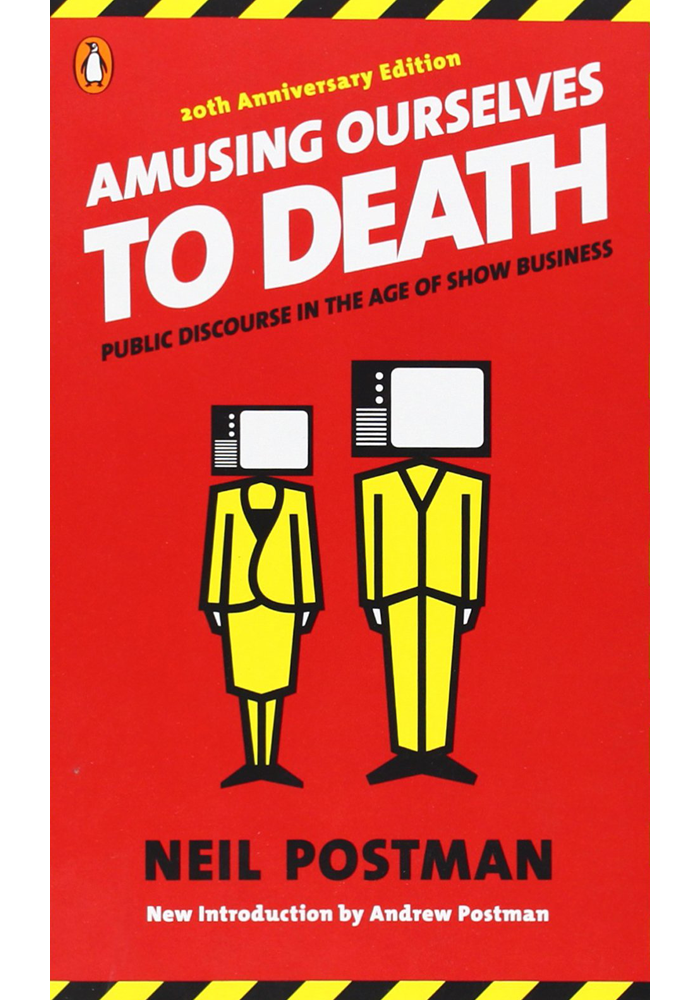Pause what you are doing. Turn off every device that makes noise in your house. Crack a window and listen carefully. Can you hear a faint sound not unlike the sniffle of a boy hiding in the bathroom after having had his lunch money stolen? This is the whimper of men from every tribe, tongue, and nation waking up to a reality even more terrifying than an economic recession or a lung-eating virus. Guys everywhere are realizing that there are no sports – and will be no sports – for weeks, even months, on end. Like nicotine addicts scouring the shelves of Whole Foods for cigarettes, we keep checking ESPN only to discover that the world croquet championship is the last vestige of athletics left in the universe. The grief is more than we can bear.
The Most Important Idea from Amusing Ourselves to Death
Picking a single most important idea from Amusing Ourselves to Death is like choosing a most beautiful artifact from the Louvre in Paris. Choice paralysis is a phrase that comes to mind. Yet, if a Marxist professor pointed a gun at my head and forced me to answer the question, this would be my choice…
5 More Culture-Quaking Ideas from Amusing Ourselves to Death
6 Radical Ideas from Amusing Ourselves to Death
‘Together, this ensemble of electronic techniques called into being a new world - a peek-a-boo world, where now this event, now that, pops into view for a moment, then vanishes again. It is a world without much coherence or sense; a world that does not ask us, indeed, does not permit us to do anything; a world that is, like the child’s game of peek-a-boo, entirely self-contained. But like peek-a-boo, it is also endlessly entertaining’ (Neil Postman).
Cheat Sheet for Chapter 1 of Amusing Ourselves to Death
The Most Important Question for Life Planning: Am I Doing the One Thing Needed?
The busyness of modern life needs no description. Society, culture, class, parents, employers, government, marriage, children, church, and self all have a different set of expectations that add weight to the burden of life. Men feel immense pressure to attempt to mimic the Greek titan Atlas whose job it was to shoulder…
Self-Control Requires Renewing the Mind
Most people have a simplistic understanding of self-control. They reduce it to two basic motions. There is the brake pedal and the accelerator. To exercise self-control a person either presses down on the brakes to resist temptation (e.g. eating a second cookie) or steps on the accelerator to overcome fatigue (e.g. finish the last mile)…
To Whom Much Is Given: Recognizing Your Talents and Setting Your Pace
Men, if you haven’t already, listen to this podcast by Rod Olps, ‘To Whom Much Is Given: Recognizing Your Talents and Setting Your Pace’. Rod will help you think about discerning God’s call on your life. Download it to your phone and listen in the car, in the gym, or when you have dead time between tasks.
The Importance of Setting Thresholds
The application for men is this: to be good stewards of our lives we need to set wise limits on our use of time, money, amusement, exercise, and so on. What should a man do if his income continues to increase through the duration of his career? Should he correspondingly raise his lifestyle unceasingly to match his salary? No, to do so would be to allow circumstances to dictate lifestyle rather than the call to follow Jesus. A better approach is for a man to sit down in prayer before God and to determine a threshold of how much he personally feels he can spend on his lifestyle as a good steward of the gifts of God. Any excess above this threshold should be used to invest in the kingdom of God. After all, the goal of life is not self-improvement, or to have a good time, but the glory of Christ.
Re Life Planning: Three Distortions regarding the Spiritual Calling of Men
God has called you to do something, to be something. This thought ought to quake the very foundation of your soul. Geologist warn us that one day San Francisco will lie in rubble due to straddling the San Andreas Fault. Christians should fare no better when they are told that God has purposefully created them. We are not accidents like a puddle of milk spilt from the cup of a careless child. We are instruments crafted in the forge of heaven for specific and non-negotiable tasks.
Avoiding the Pitfalls of Mainstream Life Planning
A man who ignores the future is like a person who walks around staring at his feet. He will miss a lot of useful paths in life because he never looked up to survey the landscape. The undeniable benefit of life planning is that the activity protects a person from ‘drift’, the mindless persistence along an unspecified course. Of course, for Christians, a deep attitude of humility must correspond to any attempt at life planning, since our lives are ultimately in God’s hands and because the future belongs to Him, not us. Nonetheless, most men will find spiritual relevance in Eisenhower’s quip, ‘Plans are worthless, but planning is everything’.
Life Planning Enables Christian Men to Avoid Three Dangers
Life Planning Is for Self-Control, Not Self-Fulfilment
Men like to pretend that they are warhorses. We tell ourselves that self-control is a natural muscle that can be flexed at will and that develops coordination and stamina over time. Our problem with self-control, so we think, is not that we don’t have it, but that we choose not to use it. Like a warhorse, we are capable of showing self-restraint in difficult circumstances. We are men, not boys. We are soldiers, not recruits. So we think…
How to Build a Band of Spiritual Friends
One of the greatest risks a man can take is to attempt the Christian life on his own. The deceitfulness of the heart by itself is a sufficient reason to walk close to others who are wise and faithful. Long ago Solomon recorded the proverb, ‘Whoever isolates himself seeks his own desire; he breaks out against all sound judgment’ (Proverbs 18:1). This wisdom is much needed today. A man who isolates himself is a man in danger…
Accountability: the Third Benefit of Spiritual Camaraderie
By the time David was contemplating a night with Bathsheba his blood was already boiling. Lust had already mounted a siege against the conscience and was catapulting missiles against the will. What would have been the very best safety valve for David while he was pacing the decking of his palace? He should have had Abiathar the priest, or Nathan the prophet, or some other man of God walking with him. A good friend would have smacked him across the face and told him to recollect the life of Saul before dabbling in sin.
Inspiration: the Second Benefit of Spiritual Camaraderie
There is no guardrail more useful that a circle of spiritual friends. Hearing such words as ‘Don’t give up!’, ‘Where were you?’, ‘You can do all things through Christ who strengthens you,’ or ‘Fear not! God is with you,’ can be a cup of Gatorade on a hot day, refreshing the heart and supplying strength for yet another leg of the race.
Affirmation: the First Benefit of Spiritual Camaraderie
Many a Christian man will step each day into a workplace in which he is the only person around him whose life goal is to know, serve, and delight in the lord Jesus Christ. He will feel like an exile in a foreign land, trying to maintain an identity that is threatened by the culture around him. In such arid conditions, the vitality of faith begins to evaporate, drop by drop, day by day. Zeal will cool; focus will relax; resolve will weaken.
Covenant Agreement: the Third Trait of Spiritual Camaraderie
Shared Thermostat: the Second Mark of Spiritual Camaraderie
Spiritual friendship requires shared consent regarding the desired temperature of discipleship. Different Christians have different interpretations of what it means to be a devout follower of Jesus. Some are happy to exist in a tepid, lukewarm state. Others feel the need to kick-start the burner whenever the boil drops to a simmer. Spiritual friendship is distinct from other Christian relationships because spiritual appetites must be in sync. Such friends not only share a sense of where they are going, but there is a pace, an earnestness, that all hope to maintain.
Right Intent: the First Mark of Spiritual Camaraderie
Yet, intentionality, by itself, is insufficient to produce spiritual friendship. The intent must be right. Spiritual friends are comrades who join together in pursuit of Christ. The following words of Paul are an apt description of the basic intent that drives one Christian to partner with another: ‘That I may know him and the power of his resurrection, and may share in his sufferings, becoming like him in his death, that by any means possible I may attain the resurrection from the dead’ (Phil. 3:11). Knowing Christ, obeying Christ, being conformed to Christ – these are the objectives pursued in spiritual friendship.


















